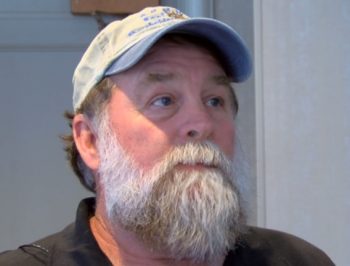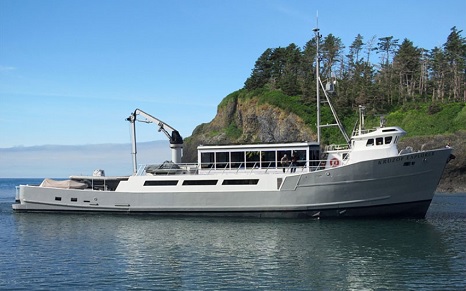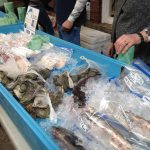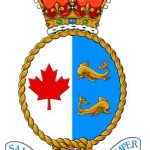Monthly Archives: February 2017
Proposed Maine Elver Eel Lottery Would Keep Industry Viable
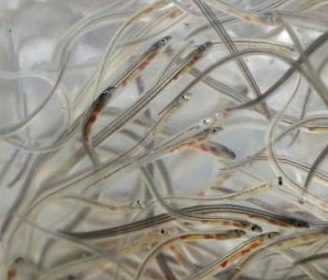 A proposal to create a new lottery system to allow people into Maine’s big-money baby eel fishery is the best way to keep the industry sustainable, some fishermen say. Baby eels are a prized resource in Maine, where they are fished from rivers and streams and sold to Asian aquaculture companies in countries such as China and South Korea. The baby eels, or elvers, can sell for more than $2,000 per pound. The eels eventually get raised to adulthood and turned into food, such as sushi, with some spanning the globe to come back to American restaurants. Right now, entry into the fishery is closed. A Maine trade group for elver fishermen is supporting a proposed state law that would allot new elver fishing permits via a lottery. The group’s president, Darrell Young, said members of the fishery are aging and the lottery system will let new people in. “We’re all getting older and eventually we’re going to pass away,” Young said. “As people die off or give up or whatever, there will be a drawing.” Read the story here 14:36
A proposal to create a new lottery system to allow people into Maine’s big-money baby eel fishery is the best way to keep the industry sustainable, some fishermen say. Baby eels are a prized resource in Maine, where they are fished from rivers and streams and sold to Asian aquaculture companies in countries such as China and South Korea. The baby eels, or elvers, can sell for more than $2,000 per pound. The eels eventually get raised to adulthood and turned into food, such as sushi, with some spanning the globe to come back to American restaurants. Right now, entry into the fishery is closed. A Maine trade group for elver fishermen is supporting a proposed state law that would allot new elver fishing permits via a lottery. The group’s president, Darrell Young, said members of the fishery are aging and the lottery system will let new people in. “We’re all getting older and eventually we’re going to pass away,” Young said. “As people die off or give up or whatever, there will be a drawing.” Read the story here 14:36
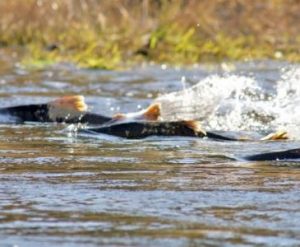
Bay-Delta Water Case Against EPA Advances
A federal judge refused Tuesday to dismiss allegations that the Environmental Protection Agency shirked its duty to review temporary changes California made to its water-quality standards during the drought, an action that environmentalists say shrank the state’s salmon and steelhead fish populations. U.S. District Judge Jon Tigar denied a motion by the EPA to dismiss the lawsuit filed against it last year by the Natural Resources Defense Council, the Bay Institute and Defenders of Wildlife. Tigar said their claims are not moot and that they plausibly alleged that the EPA was required under the Clean Water Act to review the changes to more than two dozen water quality standards to protect fish and wildlife in the Bay-Delta Estuary. Read the story here 13:42
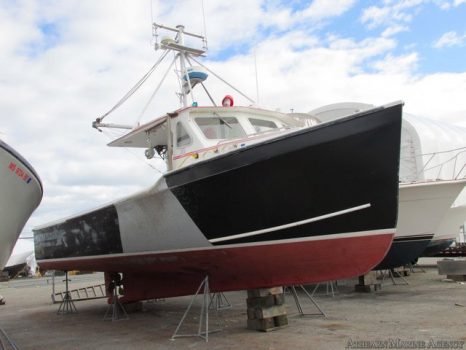
Athearn Marine Agency Boat of the Week: 38′ Dixon Lobster/Gillnetter, 375HP, 6 Cylinder John Deere
Specifications, information and 27 photo’s click here To see all the boats in this series, Click here 12:36
Fishing For Litter: We’ve got ‘healthier’ fish after success of the sea litter scheme
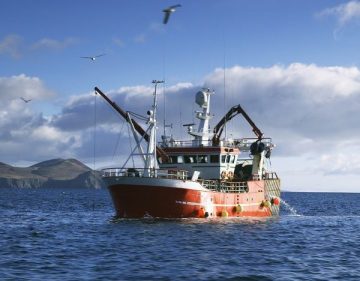 It may be a load of rubbish but for the fishing industry, the discarded waste being piled up at harbours across Scotland is netting them a prize catch. Fishing boats once dumped junk they hauled up in their nets back overboard. Now they bag the refuse and take it to port to be disposed of. The Fishing For Litter scheme has just reached the milestone of pulling 1000 tonnes of potentially dangerous refuse from the seabed. Jimmy Buchan, who starred in the BBC TV series Trawler-men, documenting the work of fishermen, said: “When we first started it, we would maybe lift a tonne of rubbish in a trip but I know it is working because now we hardly fill the bottom of a bag. “What we have done means that we are having an environmentally positive effect.” Read the story here 12:07
It may be a load of rubbish but for the fishing industry, the discarded waste being piled up at harbours across Scotland is netting them a prize catch. Fishing boats once dumped junk they hauled up in their nets back overboard. Now they bag the refuse and take it to port to be disposed of. The Fishing For Litter scheme has just reached the milestone of pulling 1000 tonnes of potentially dangerous refuse from the seabed. Jimmy Buchan, who starred in the BBC TV series Trawler-men, documenting the work of fishermen, said: “When we first started it, we would maybe lift a tonne of rubbish in a trip but I know it is working because now we hardly fill the bottom of a bag. “What we have done means that we are having an environmentally positive effect.” Read the story here 12:07
Everglades National Park Superintendent suspends new fee after outcry
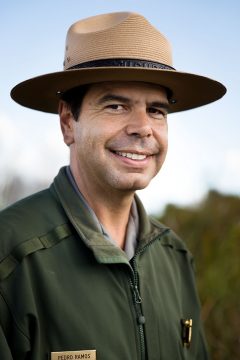 Following pushback from some local professional fishing guides, Everglades National Park Superintendent Pedro Ramos has suspended a new rule that would have required a per person fee for vessels entering federal waters in Florida Bay. Late last month, a park email was circulated that informed a handful of Upper Keys guides that enforcement of an entrance fee for people on vessels would begin in April. This included customers aboard a commercial boat, recreational anglers on a personal boat and kayakers. The park’s general management plan, which became effective last year after over a decade in the making, said that vessels in the future could be charged a per person fee. It didn’t have a specific date, though. Last month was the first many became aware of the plan to enforce it. Currently, an entrance fee is paid only by those coming to the park by land.. Read the story here 11:32
Following pushback from some local professional fishing guides, Everglades National Park Superintendent Pedro Ramos has suspended a new rule that would have required a per person fee for vessels entering federal waters in Florida Bay. Late last month, a park email was circulated that informed a handful of Upper Keys guides that enforcement of an entrance fee for people on vessels would begin in April. This included customers aboard a commercial boat, recreational anglers on a personal boat and kayakers. The park’s general management plan, which became effective last year after over a decade in the making, said that vessels in the future could be charged a per person fee. It didn’t have a specific date, though. Last month was the first many became aware of the plan to enforce it. Currently, an entrance fee is paid only by those coming to the park by land.. Read the story here 11:32
Killer virus that devastated Gold Coast prawn farmers is on the doorstep of Moreton Bay’s multimillion-dollar fishing industry.
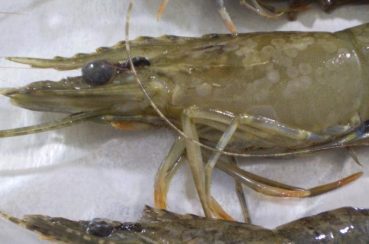 More than 100 wild prawns just south of the Logan River in Southern Moreton Bay have tested positive to the virus responsible for the deadly white spot disease. The virus can kill whole ponds of prawns within days and experts fear it could easily spread to other crustaceans such as mud crabs and Moreton Bay bugs. Announcing the positive testing of 108 wild prawns yesterday, Biosecurity Queensland confirmed the outbreak that ravaged prawn farmers for the past two months had been found outside the Logan River for the first time. Griffith University ecologist Professor Michelle Burford said the disease could move into the main part of Moreton Bay, threatening a large chunk of Queensland’s $120 million wild-caught fishing industry. “There is every potential for the disease to move into other areas,” Prof Burford said. Read the story here 09:41
More than 100 wild prawns just south of the Logan River in Southern Moreton Bay have tested positive to the virus responsible for the deadly white spot disease. The virus can kill whole ponds of prawns within days and experts fear it could easily spread to other crustaceans such as mud crabs and Moreton Bay bugs. Announcing the positive testing of 108 wild prawns yesterday, Biosecurity Queensland confirmed the outbreak that ravaged prawn farmers for the past two months had been found outside the Logan River for the first time. Griffith University ecologist Professor Michelle Burford said the disease could move into the main part of Moreton Bay, threatening a large chunk of Queensland’s $120 million wild-caught fishing industry. “There is every potential for the disease to move into other areas,” Prof Burford said. Read the story here 09:41
SLO County supervisors vote 3-2 to oppose Chumash National Heritage Marine Sanctuary
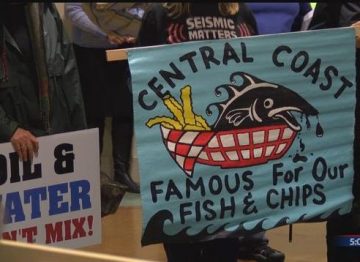 After hours of public comment and discussion, the San Luis Obispo County Board of Supervisors voted 3-2 passing a resolution to oppose the proposed Chumash National Heritage Marine Sanctuary. Prior to the 9:00 a.m. meeting, protestors rallied in front of the County Government Center in downtown San Luis Obispo, holding signs in support of the sanctuary,,, Opponents of the sanctuary argue it’s unnecessary. “The marine sanctuary is an overreaching regulatory issue and we don’t need it here on the Central Coast,” said Amber Johnson, a local political consultant. Others who also opposed the sanctuary said it would hurt the small commercial fishing industry and that there doesn’t need to be another layer of government. Chris Voss, a commercial fisherman from Santa Barbara, said he’s experienced the negative side of coastal sanctuaries. “Their declaration that they will not interfere with local fisheries has not been the case,” Voss said. Read the story here 09:00
After hours of public comment and discussion, the San Luis Obispo County Board of Supervisors voted 3-2 passing a resolution to oppose the proposed Chumash National Heritage Marine Sanctuary. Prior to the 9:00 a.m. meeting, protestors rallied in front of the County Government Center in downtown San Luis Obispo, holding signs in support of the sanctuary,,, Opponents of the sanctuary argue it’s unnecessary. “The marine sanctuary is an overreaching regulatory issue and we don’t need it here on the Central Coast,” said Amber Johnson, a local political consultant. Others who also opposed the sanctuary said it would hurt the small commercial fishing industry and that there doesn’t need to be another layer of government. Chris Voss, a commercial fisherman from Santa Barbara, said he’s experienced the negative side of coastal sanctuaries. “Their declaration that they will not interfere with local fisheries has not been the case,” Voss said. Read the story here 09:00
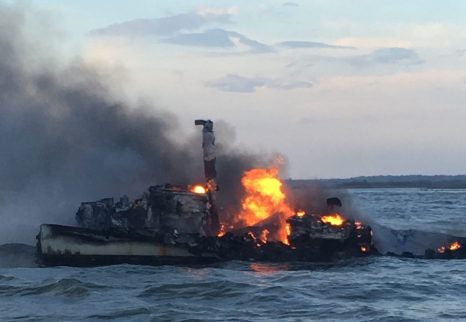
Coast Guard rescues 3 fishermen after vessel catches fire near St. Catherines Island, Ga.
The Coast Guard rescued three fishermen Tuesday after the fishing vessel they were on caught fire 1 mile east of St. Catherines Island, Georgia. Coast Guard Sector Charleston Command Center watchstanders received a call from a crew member aboard the fishing vessel Sea Puppy at 3:16 p.m. who stated their boat was on fire and taking on water. A Coast Guard Station Tybee Island 29-foot Response Boat – Small boat crew and an Air Station Savannah MH-65 Dolphin helicopter aircrew launched at approximately 3:25 p.m. The Dolphin crew arrived on scene at 4:30 p.m., hoisted the fishermen and transported them to Air Station Savannah to awaiting EMS. No injuries were reported. Coast Guard pollution investigators arrived on scene, and the cause of the fire is under investigation. 19:17
HOOKED UP! PART II: Gulf Council chief talks about IFQ’s
 The Gulf of Mexico Fishery Management Council manages the fishery resources in the federal waters of the Gulf of Mexico. It’s one of eight regional fishery management councils in the United States. The Gulf Council essentially manages the fishery from the nine-mile mark out to the 200-mile limit. “Before the IFQ, we tried a variety of ways to address the race for fish that was taking place,” says Dr. Roy Crabtree, regional administrator for the Gulf Council. “We had a limited commercial quota for red snapper. The fishermen were catching it up as quick as they could. They were flooding the market with fish Fishery was closed most of the year, so we didn’t have year-round production. And we had safety-at-sea issues. Because fishermen were fishing in unsafe sea conditions. And we were having overruns of quota. Crabtree says the IFQ program was designed largely to address these problems. The article continues here 18:00
The Gulf of Mexico Fishery Management Council manages the fishery resources in the federal waters of the Gulf of Mexico. It’s one of eight regional fishery management councils in the United States. The Gulf Council essentially manages the fishery from the nine-mile mark out to the 200-mile limit. “Before the IFQ, we tried a variety of ways to address the race for fish that was taking place,” says Dr. Roy Crabtree, regional administrator for the Gulf Council. “We had a limited commercial quota for red snapper. The fishermen were catching it up as quick as they could. They were flooding the market with fish Fishery was closed most of the year, so we didn’t have year-round production. And we had safety-at-sea issues. Because fishermen were fishing in unsafe sea conditions. And we were having overruns of quota. Crabtree says the IFQ program was designed largely to address these problems. The article continues here 18:00
To Mass. DMF Director Dave Pierce Phd., Loligo Fishing Nantucket & Marthas Vinveyard
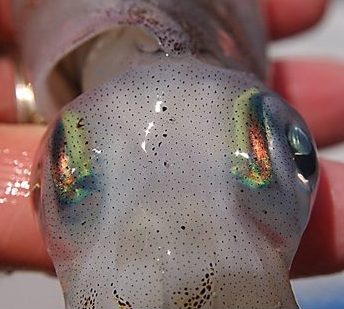 I have been a consistent reader of John McMurray’s contribution to conservefish.org. I have valued his writings due to his activity on the water and his due diligence in obtaining all the facts. With that stated I believe he has overstepped his expertise in his most recent article In Marthas Vineyard & Nantucket, There Ain’t No Stripas. As a writer and council member McMurray has substantial amount of input when it comes to policy changes within the fisheries regulatory arena. Upon reading this piece, I was inspired to write a rebuttal article with the goal of enlightenment and advocacy for the commercial Loligo industry. As a fourth generation commercial fisherman from Point Judith, Rhode Island I have generational knowledge of Doryteuthis pealaeii otherwise known as Loligo, Summer Squid, Longfin Squid and my personal favorite name, Rhode Island’s official appetizer Calamari. Read the rebuttal here by Spencer Bode 14:23
I have been a consistent reader of John McMurray’s contribution to conservefish.org. I have valued his writings due to his activity on the water and his due diligence in obtaining all the facts. With that stated I believe he has overstepped his expertise in his most recent article In Marthas Vineyard & Nantucket, There Ain’t No Stripas. As a writer and council member McMurray has substantial amount of input when it comes to policy changes within the fisheries regulatory arena. Upon reading this piece, I was inspired to write a rebuttal article with the goal of enlightenment and advocacy for the commercial Loligo industry. As a fourth generation commercial fisherman from Point Judith, Rhode Island I have generational knowledge of Doryteuthis pealaeii otherwise known as Loligo, Summer Squid, Longfin Squid and my personal favorite name, Rhode Island’s official appetizer Calamari. Read the rebuttal here by Spencer Bode 14:23
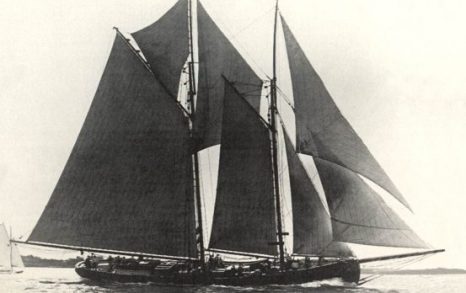
The fishing schooner Mina Swim and crew of 21 never seen again after leaving Burin a century ago
It was a tragedy that left families devastated, and changed Burin forever, but the sinking of the Mina Swim might have been forgotten if not for the work of local residents determined to keep the memory alive. On Tuesday, Burin will mark the 100th anniversary of that tragedy. The fishing schooner Mina Swim left Burin on the afternoon of Feb. 7, 1917, with a crew of 21 on board. It was bound for fishing grounds on the southwest coast of Newfoundland. It was never seen or heard from again. “Back in 1917, the community wouldn’t have been that big, then you have twenty-one of your men taken away in one tragedy,” said Howard Lundrigan, who lost a cousin in the sinking. Eighteen widows and 57 children were left without husbands and fathers. Read the story here 12:27
Proposed Cape Breton Trough Marine Protected Area – Fishermen left in the dark
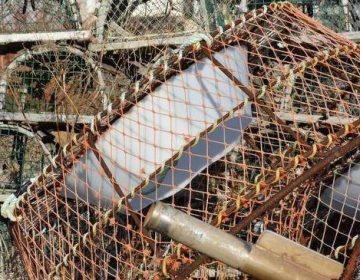 Cape Breton fishermen are concerned that a proposed Marine Protected Area (MPA) off the western coast of the island could result in the closure of the local snow crab fishery. Bill MacDonald, a fisherman for three decades in the region and member of the Area 19 Snow Crab Fisherman’s Association, told the Chronicle Herald the association became aware the government was considering creating an MPA in the fishing region during a meeting with DFO officials last month, but said there’s been no additional information provided since. Because of fishing regulations in other MPAs, MacDonald said he has concerns the $70 million lobster and snow crab fishery that has supported the small coastal region for many generations could be at risk. MPAs are federally designated areas where human activity is limited in order to protect sensitive ecosystems and at-risk species. MacDonald said the association has been left in the dark, not only about the implications for the crab and lobster fishery in the area, but also about why the area is being considered at all. Read the story here 10:10
Cape Breton fishermen are concerned that a proposed Marine Protected Area (MPA) off the western coast of the island could result in the closure of the local snow crab fishery. Bill MacDonald, a fisherman for three decades in the region and member of the Area 19 Snow Crab Fisherman’s Association, told the Chronicle Herald the association became aware the government was considering creating an MPA in the fishing region during a meeting with DFO officials last month, but said there’s been no additional information provided since. Because of fishing regulations in other MPAs, MacDonald said he has concerns the $70 million lobster and snow crab fishery that has supported the small coastal region for many generations could be at risk. MPAs are federally designated areas where human activity is limited in order to protect sensitive ecosystems and at-risk species. MacDonald said the association has been left in the dark, not only about the implications for the crab and lobster fishery in the area, but also about why the area is being considered at all. Read the story here 10:10
HOOKED UP: Red snapper catch share allotment a “retirement plan” for many shareholders
 The most controversial part of the Red Snapper IFQ program may be the part that allows shareholders to sell their yearly allocation. It essentially turns some fishermen into businessmen. Our research has revealed about 120 shareholders – 37 percent of the whole – sell their entire allocation each year. It allows the shareholders to make tens, and in some cases, hundreds of thousands of dollars a year. Galveston commercial fisherman Buddy Guindon defends these fishermen ”It’s his retirement,” he tells us. Slidell commercial fisherman Tommy Williams thinks some of the program needs to be tweaked, but he thinks these shares provide security for retirement fishermen “They worked for the shares,” Williams says. “They were out here, getting their hands cut, cut by fish, bit by fish, baiting hooks. That is their retirement because most fishermen don’t have a 401(k). This is their 401(k).” FOX 8 News sent letters to the fishermen who appeared to be selling their yearly allocations. We heard back from many of them. Read the story here 09:20
The most controversial part of the Red Snapper IFQ program may be the part that allows shareholders to sell their yearly allocation. It essentially turns some fishermen into businessmen. Our research has revealed about 120 shareholders – 37 percent of the whole – sell their entire allocation each year. It allows the shareholders to make tens, and in some cases, hundreds of thousands of dollars a year. Galveston commercial fisherman Buddy Guindon defends these fishermen ”It’s his retirement,” he tells us. Slidell commercial fisherman Tommy Williams thinks some of the program needs to be tweaked, but he thinks these shares provide security for retirement fishermen “They worked for the shares,” Williams says. “They were out here, getting their hands cut, cut by fish, bit by fish, baiting hooks. That is their retirement because most fishermen don’t have a 401(k). This is their 401(k).” FOX 8 News sent letters to the fishermen who appeared to be selling their yearly allocations. We heard back from many of them. Read the story here 09:20
A Time to Build & Refit
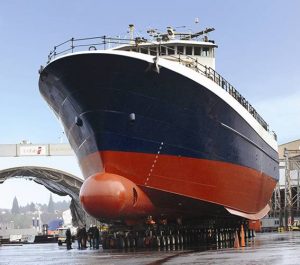 The aging Pacific Northwest fishing fleet is either undergoing or about to undergo a long-overdo upgrade, judging by a major economic report commissioned by the Port of Seattle. Fisheries managers, seafood suppliers, yards and the supply chain all hope an accompanying surge in ship finance “lifts all boats”. For now, the newbuild count is growing apace, slowed just a bit by owners opting for major retrofits amid rich fish harvests. This fisheries upsurge comes with some rising stars of ship design-and-build for vessels set to ply the Bering and Beaufort seas. The ’70s were the heyday of boatbuilding — half of the current U.S. Pacific Northwest’s 400-strong fleet of vessels over 58 feet were built when sideburns were mandatory. The fleet’s boats are so well-maintained, most of them, that they’re still candidates for retrofits of engines, holds, electrical systems and deck machinery. Read the story here 08:14
The aging Pacific Northwest fishing fleet is either undergoing or about to undergo a long-overdo upgrade, judging by a major economic report commissioned by the Port of Seattle. Fisheries managers, seafood suppliers, yards and the supply chain all hope an accompanying surge in ship finance “lifts all boats”. For now, the newbuild count is growing apace, slowed just a bit by owners opting for major retrofits amid rich fish harvests. This fisheries upsurge comes with some rising stars of ship design-and-build for vessels set to ply the Bering and Beaufort seas. The ’70s were the heyday of boatbuilding — half of the current U.S. Pacific Northwest’s 400-strong fleet of vessels over 58 feet were built when sideburns were mandatory. The fleet’s boats are so well-maintained, most of them, that they’re still candidates for retrofits of engines, holds, electrical systems and deck machinery. Read the story here 08:14
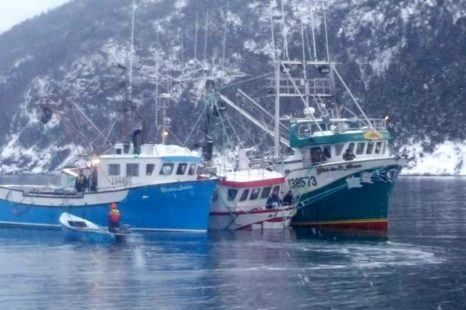
Capt. Michael Joyce gets scare after weather forces him to abandon fishing seiner
Lark Harbour, N.L. — Michael Joyce got a bad scare and was stomach sick for a few days, but he know things could have been much worse for him so he was looking on the bright side of a tough day on the water. Joyce, 49, of Lark Harbour, is the captain of Joyce’s Journey, a 45-foot seiner that he uses to catch herring, mackerel and caplin. Joyce and his four crew members headed out the Bay of Islands on Dec. 18 for the last haul of herring for the season. At the edge of darkness, on what Joyce said was a beautiful evening at the time, they saw fish in the bay and decided to set the sein with hopes of landing a big haul. Within minutes, a strong, steady windy came up in the bay. The crew managed to set the sein, and when it came time to haul it back on board the wind bore down on them. Read the story here 20:35
Ryan Cleary – Russell Wangersky’s column demands a response
 I wish to respond to Russell Wangersky’s Jan. 28th column (Fish harvesters have the most to lose), by noting with interest how Wangersky gets along with me, “on and off,” while he has known Lana Payne since the late 1980s when the two worked together at The Sunday Express. Does that mean Wangersky loves Lana more than me? I can’t quite tell. I know that Payne calls me as a “narcissist” and “liar,” and Wangersky spits out the word nationalist when he tackles me on the page. Personally, I see myself more Newfoundland and Labrador first, as opposed to Wangersky, who’s more Canadian first, which, “on and off,” separates us. Wangersky clearly states what he thinks about Newfoundland and Labrador opening the door to out-of-province fish buyers — he’s against it, “damaging the province as a whole by shipping a common resource out of province for the benefit of a few.” The “few” that Wangersky refers to are the few thousand inshore fish harvesters left in this province who can’t survive on 60-cents-a-pound cod, certainly not when there’s little else left to catch. Read the rest of Mr. Cleary’s letter here 19:24
I wish to respond to Russell Wangersky’s Jan. 28th column (Fish harvesters have the most to lose), by noting with interest how Wangersky gets along with me, “on and off,” while he has known Lana Payne since the late 1980s when the two worked together at The Sunday Express. Does that mean Wangersky loves Lana more than me? I can’t quite tell. I know that Payne calls me as a “narcissist” and “liar,” and Wangersky spits out the word nationalist when he tackles me on the page. Personally, I see myself more Newfoundland and Labrador first, as opposed to Wangersky, who’s more Canadian first, which, “on and off,” separates us. Wangersky clearly states what he thinks about Newfoundland and Labrador opening the door to out-of-province fish buyers — he’s against it, “damaging the province as a whole by shipping a common resource out of province for the benefit of a few.” The “few” that Wangersky refers to are the few thousand inshore fish harvesters left in this province who can’t survive on 60-cents-a-pound cod, certainly not when there’s little else left to catch. Read the rest of Mr. Cleary’s letter here 19:24
Maine Lobstermans integrity is upheld in court when cleared of unlicensed fishing charge
 Every once in a while, a case comes along that serves as a reminder that Maine courts, like the state’s many law enforcement agencies, are a part of what is loosely called the justice system and that most of the people who work in the courts and law enforcement agencies want to see justice done. Last week, Trenton lobsterman Jacob White found himself before Superior Court Justice Robert E. Murray facing a civil violation of the state’s marine resources laws for fishing without a lobster license last October. Also before the court was the state’s seizure of 156 pounds of lobster White landed at the Seal Cove wharf on the day Marine Patrol Officer Jeff Turcotte issued the summons for unlicensed lobstering. White decided to fight the case and, perhaps a surprise, he won. “I take pride in being a good fisherman and an honest fisherman,” White told the judge. Murray evidently agreed,,, Read the story here 17:59
Every once in a while, a case comes along that serves as a reminder that Maine courts, like the state’s many law enforcement agencies, are a part of what is loosely called the justice system and that most of the people who work in the courts and law enforcement agencies want to see justice done. Last week, Trenton lobsterman Jacob White found himself before Superior Court Justice Robert E. Murray facing a civil violation of the state’s marine resources laws for fishing without a lobster license last October. Also before the court was the state’s seizure of 156 pounds of lobster White landed at the Seal Cove wharf on the day Marine Patrol Officer Jeff Turcotte issued the summons for unlicensed lobstering. White decided to fight the case and, perhaps a surprise, he won. “I take pride in being a good fisherman and an honest fisherman,” White told the judge. Murray evidently agreed,,, Read the story here 17:59
Could N.J. defy summer flounder cuts?
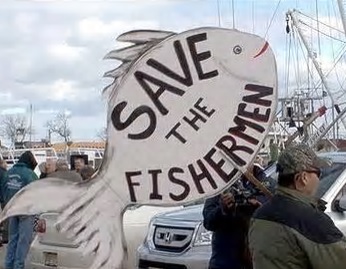 It didn’t take long after the Atlantic States Marine Fisheries Commission voted to slash summer flounder harvest quotas for the rumblings of anglers calling for New Jersey to defy the regulations to pick up. The ASMFC ordered the harvest cut by 40-percent based on science that indicates the fish is declining in abundance and survey data that reports anglers overreached their quotas last year. The science and angling surveys are at the center of the issue. Many lawmakers in New Jersey and its environmental chief have expressed concern about its accuracy because it relies on random sampling. “We understand the long-term impacts of overfishing a species. But we also know for a fact that fluke are abundant and the population is stable off New Jersey,” said Bob Martin, the Commissioner of the state’s Department of Environmental Protection. Video, Read the story here 16:25
It didn’t take long after the Atlantic States Marine Fisheries Commission voted to slash summer flounder harvest quotas for the rumblings of anglers calling for New Jersey to defy the regulations to pick up. The ASMFC ordered the harvest cut by 40-percent based on science that indicates the fish is declining in abundance and survey data that reports anglers overreached their quotas last year. The science and angling surveys are at the center of the issue. Many lawmakers in New Jersey and its environmental chief have expressed concern about its accuracy because it relies on random sampling. “We understand the long-term impacts of overfishing a species. But we also know for a fact that fluke are abundant and the population is stable off New Jersey,” said Bob Martin, the Commissioner of the state’s Department of Environmental Protection. Video, Read the story here 16:25
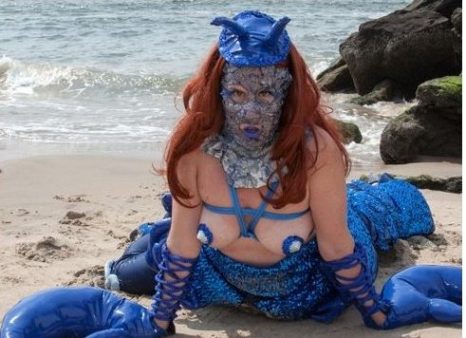
Unhinged NYU ‘Professor’ Whose Hissy Fit Went Viral Turns Out to Be Lobster Porn Artist
There are more lifestyles than you can shake a stick at in modern America. Whether you want to live as an animal, or a six-year-old, or a lizard, there’s just no end to the choices one can make regarding how you live your life these days in the free world. (This may be our penance for the invention of robot vacuum cleaners. With no physical labor left to do, human beings turn insane, apparently.) How exactly do you tell your parents you’ve decided to go into “lobster porn” like social media sensation Rebecca Goyette, whose expletive-filled hissy fit outside NYU went viral (NSFW). I imagine the conversation went something like this via email. Dear Mom and Dad, I know you had high hopes that I would take my art degree and perhaps teach children to paint or create beautiful landscapes to sell to tourists in some tropical location, but none of that is going to happen. I wanted you to know your money was well spent because I have found a niche in the performance art community: Lobster porn. read the rest here, and have a good laugh! 14:48
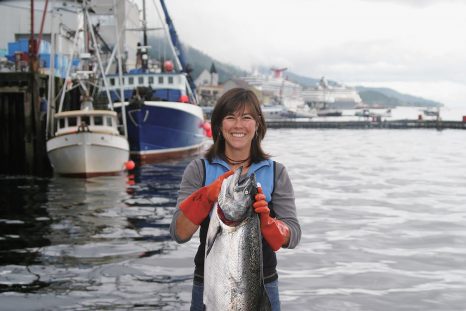
Alaska’s Female Fishermen (Yes, That’s Really a Thing) On Gender Labels, Finding Zen and Weathering Life’s Storms
There’s a hashtag going around twitter to #DressLikeAWoman. It’s pretty much an invitation to challenge the ideas of how women dress, and how what they wear does or does not define them in life. To that end, I spoke with two Alaskan female fishermen (yes, that’s the correct terminology!) to find out about the challenges of being a woman in an almost exclusively male-run industry. Why Fisherman and not Fisherwoman? When I asked why they prefer the term “fishermen” and not “fisherwoman,” Marsh said, “You earn respect as a male or female fisher, so the gender labels are not necessary. You work hard to be one of the crew and respected, not one of “the guys”—there’s a big difference.” Becker weighed in by saying, “My sense is that both men and women who fish have to prove themselves. It’s not an easy or forgiving industry, because mistakes can be dangerous, if not deadly. To rename the category “fisherwoman” or “fisher” could take away from that elite status that we’ve worked just as hard to attain (and sometimes, harder, as with most occupations in the world).” Read the story here 13:39
Always Top Quality! Your Seafreeze Ltd. Preferred Price List for February 6, 2017 Has Arrived
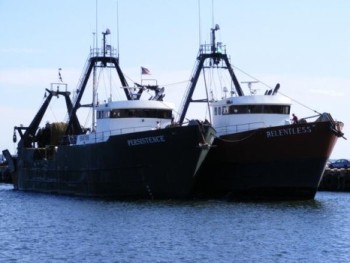 Contact our sales team today @ 401 295 2585 or 800 732 273 Click here for the complete price list from Seafreeze Ltd. – We are Direct to the Source-We are Fishermen-We are Seafreeze Ltd! Visit our website! 12:10
Contact our sales team today @ 401 295 2585 or 800 732 273 Click here for the complete price list from Seafreeze Ltd. – We are Direct to the Source-We are Fishermen-We are Seafreeze Ltd! Visit our website! 12:10
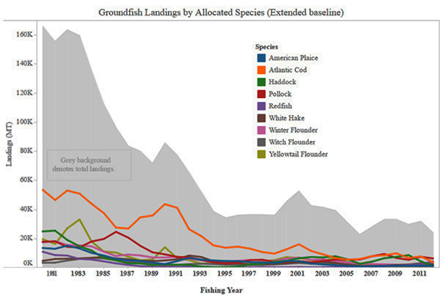
Fishery Mismanagement: FishNet USA – Choking on good(?) intentions
From the article: We have fisheries that are on the verge of collapse while the fish stocks that support them are healthy. There is a wanton disregard for the health of the businesses that depend of fishing, a disregard that wasn’t really there until the environmental community, funded by a handful of “charitable” mega-foundations (including the Gordon and Betty Moore Foundation), started to interfere in the federal fishery management process. Having healthy fish stocks, their supposed goal, is meaningless without healthy businesses benefitting from the utilization of those stocks. Today the economic effects of management actions on fishing and fishing dependent businesses are at best given lip service; the only thing that really matters when management decisions are considered is whether or not “overfishing” will be ended. The argument for the almost total focus on the health of the stocks, a concept that is exemplified by the above four sources of uncertainty from a study that was paid for – surprise, surprise! – by one of the mega-foundation that has spent many millions of dollars on “fixing” fisheries, is that healthy fish stocks are supposed to mean healthy fisheries. The present condition of the New England groundfish fishery shows how wrong that supposition is. Read the full article, click here 11:41
New Man Overboard Prevention and Sea Survival Course for Fishermen
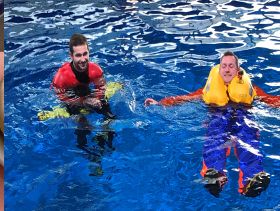 A ground breaking new pilot training course for fishermen aimed at preventing man overboard incidents and improving survival and recovery procedures has just been completed at the RNLI’s Training College in Poole, Dorset. The RNLI, working in conjunction with the UK fishing industry, has developed the two-day training course to better reflect real-life sea conditions so as to ensure fishermen are fully aware of the dangers and challenges of man overboard situations. The training pilot featured a variety of different scenarios, including enabling the participants to compare the differences of being in the water with and without survival gear. The challenges of recovering a man overboard wearing a personal flotation device were also practised, including self-recovery for the single boat fisherman and for those who work as part of a crew. Skipper Peter Bruce from the fishing vessel Budding Rose, who took part in the training, said that the two day course had been incredibly useful. “I hope that I can pass on some of the knowledge gained to my own crew and I believe that fishermen’s training should change to be more in line with the environment we work in,” he said. Read the story here 10:23
A ground breaking new pilot training course for fishermen aimed at preventing man overboard incidents and improving survival and recovery procedures has just been completed at the RNLI’s Training College in Poole, Dorset. The RNLI, working in conjunction with the UK fishing industry, has developed the two-day training course to better reflect real-life sea conditions so as to ensure fishermen are fully aware of the dangers and challenges of man overboard situations. The training pilot featured a variety of different scenarios, including enabling the participants to compare the differences of being in the water with and without survival gear. The challenges of recovering a man overboard wearing a personal flotation device were also practised, including self-recovery for the single boat fisherman and for those who work as part of a crew. Skipper Peter Bruce from the fishing vessel Budding Rose, who took part in the training, said that the two day course had been incredibly useful. “I hope that I can pass on some of the knowledge gained to my own crew and I believe that fishermen’s training should change to be more in line with the environment we work in,” he said. Read the story here 10:23
Letter: Give inshore fish harvesters a free vote – Peter Leonard, Southern Harbour
 On Jan. 31st, at a Labour Relations Board hearing in St. John’s, we saw — yet again — FFAW-Unifor fighting its own members who are openly seeking alternate representation for inshore fish harvesters. With what seems like unlimited financial and legal resources, FFAW-Unifor is trying to string along the process in the hopes of defeating our efforts, while FISH-NL supporters have worked tirelessly raising funds to support our initiatives. As inshore fish harvesters, we are not trying to break up FFAW-Unifor or the other sectors it represents. Inshore harvesters want to break away because we feel that the FFAW cannot and has not been able to properly represent us due to conflicts of interest with the other sectors it represents. How can we expect solid representation when the same union represents plant workers and offshore trawlermen and is receiving funding from both levels of government? How does a union fight for better fish prices for harvesters at the same time that it fights for better wages for plant workers, while in the same breath fighting both levels of government that it’s being funded by? Read the letter here 09:39
On Jan. 31st, at a Labour Relations Board hearing in St. John’s, we saw — yet again — FFAW-Unifor fighting its own members who are openly seeking alternate representation for inshore fish harvesters. With what seems like unlimited financial and legal resources, FFAW-Unifor is trying to string along the process in the hopes of defeating our efforts, while FISH-NL supporters have worked tirelessly raising funds to support our initiatives. As inshore fish harvesters, we are not trying to break up FFAW-Unifor or the other sectors it represents. Inshore harvesters want to break away because we feel that the FFAW cannot and has not been able to properly represent us due to conflicts of interest with the other sectors it represents. How can we expect solid representation when the same union represents plant workers and offshore trawlermen and is receiving funding from both levels of government? How does a union fight for better fish prices for harvesters at the same time that it fights for better wages for plant workers, while in the same breath fighting both levels of government that it’s being funded by? Read the letter here 09:39
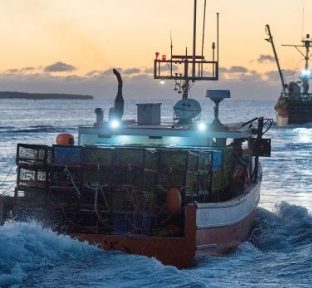
The hidden danger of Dumping Day in Nova Scotia
On Dumping Day, the hundreds of fishing boats that hit the water at the start of lobster season to set their traps can act as camouflage for a vessel in distress and hinder search and rescue efforts. In 2015, that camouflage led search and rescue technicians to jump out of a plane and miss a boat that needed their help, according to the Transportation Safety Board (TSB). Back on Nov. 30, 2015, the Royal Canadian Air Force’s Joint Rescue Coordination Centre dispatched a Hercules plane and Cormorant helicopter after two boats ran into trouble off Nova Scotia’s southwestern shore. The Cormorant and its crew managed to rescue two men who had fallen overboard from one vessel. In his report, Morrow determined that if rescue crews can’t accurately identify a vessel in distress from above, critical search and rescue operations may be delayed. Read the story here 09:08
Why doesn’t Supervisor Compton support Chumash Heritage National Marine Sanctuary? It IS Federally Funded, you know!
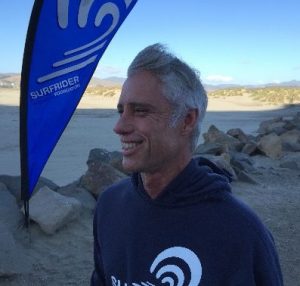 Opinion by Brad Snook, co-chair of Surfrider Foundation – San Luis Obispo Supervisor Lynn Compton, a SLO County Supervisor, is wrong to deny SLO County the federal funding of cultural education, marine research, and a new local stakeholder effort that a Chumash Heritage National Marine Sanctuary could bring. It’s Federal funding! Why wouldn’t a coastal supervisor, like Lynn Compton, support the Sanctuary, too? Supervisor Compton says she is concerned about “local control”. Supervisor Compton’s district, which is the coastal section of southern SLO County, is pivotal in decisions on whether SLO County will choose to protect the quality of its air, water, and county land. Read the rest here 08:20
Opinion by Brad Snook, co-chair of Surfrider Foundation – San Luis Obispo Supervisor Lynn Compton, a SLO County Supervisor, is wrong to deny SLO County the federal funding of cultural education, marine research, and a new local stakeholder effort that a Chumash Heritage National Marine Sanctuary could bring. It’s Federal funding! Why wouldn’t a coastal supervisor, like Lynn Compton, support the Sanctuary, too? Supervisor Compton says she is concerned about “local control”. Supervisor Compton’s district, which is the coastal section of southern SLO County, is pivotal in decisions on whether SLO County will choose to protect the quality of its air, water, and county land. Read the rest here 08:20
Boris Worm The Jellyfish Guy says New York turns into some kind of modern Venice with Sea Level Rise
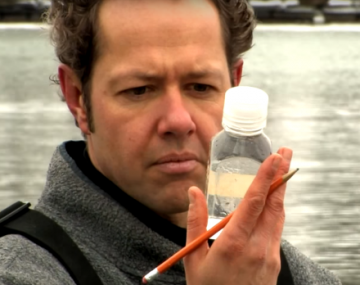 Coastal communities, including those in Newfoundland and Labrador, could be drowned by significant sea level rise before the end of the century according to a new report released by the U.S. government (NOAA). Boris Worm, a marine scientist at Dalhousie University in Halifax, N.S., says a report by the American National Oceanic and Atmospheric Administration suggests sea levels could rise by 2.5 metres by the year 2100. “They were asking the question, how will any given amount of sea level rise be felt in the U.S. and what are the likely scenarios for sea level rise given current emissions,” he told CBC Radio’s The Broadcast. “They’ve come up with a range of projections, and the notable thing here is that that range of projections is a lot larger than it used to be.” Worm said less than a decade ago, the expectation was between one and two feet of sea level rise by the end of the century. “They’ve now corrected this and said it’s going to be a lot more, and it could be up to 8.2 feet,” he said. “If that comes true, it means New York turns into some kind of modern Venice, Venice turns to some kind of Atlantis, and I don’t know what it means for Newfoundland … it really means a complete rethinking of how we live close to the coast.” Read the story here 13:45
Coastal communities, including those in Newfoundland and Labrador, could be drowned by significant sea level rise before the end of the century according to a new report released by the U.S. government (NOAA). Boris Worm, a marine scientist at Dalhousie University in Halifax, N.S., says a report by the American National Oceanic and Atmospheric Administration suggests sea levels could rise by 2.5 metres by the year 2100. “They were asking the question, how will any given amount of sea level rise be felt in the U.S. and what are the likely scenarios for sea level rise given current emissions,” he told CBC Radio’s The Broadcast. “They’ve come up with a range of projections, and the notable thing here is that that range of projections is a lot larger than it used to be.” Worm said less than a decade ago, the expectation was between one and two feet of sea level rise by the end of the century. “They’ve now corrected this and said it’s going to be a lot more, and it could be up to 8.2 feet,” he said. “If that comes true, it means New York turns into some kind of modern Venice, Venice turns to some kind of Atlantis, and I don’t know what it means for Newfoundland … it really means a complete rethinking of how we live close to the coast.” Read the story here 13:45
Coast Guard rescues 3 fishermen at mouth of Columbia River when vessel began taking on water
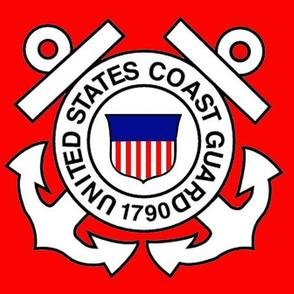 The Coast Guard rescued three commercial fishermen after their vessel began taking on water at the mouth of the Columbia River early Sunday morning. Coast Guard boat crews aboard 47-foot motor life boats, from Station Cape Disappointment in Ilwaco, Washington, assisted in dewatering the vessel and safely towing it into Skipanon Marina. Coast Guard watchstanders at Sector Columbia River received the mayday call from the captain of the fishing vessel Coastal Reign at 3:20 a.m., reporting they were taking on water from an unknown location after striking a submerged object. An aircrew aboard an MH-60 Jayhawk helicopter was immediately launched as were the MLBs. The aircrew arrived on scene first at 3:38 a.m. and the boat crews arrived shortly afterward. The crew aboard one of the MLBs passed a P-6 dewatering pump to the Coastal Reign and then put a crewmember aboard the vessel to help set it up. After dewatering the vessel, an MLB crew towed it to safety mooring it at 4:40 a.m. The sea conditions at the time of the rescue were 6-foot swells and the winds were about 15 mph from the west. A Captain of the Port order was placed on the Coastal Reign to ensure the damaged vessel is repaired properly and passes an inspection by a Coast Guard marine inspector before operating again. Listen to the May Day call link 12:25
The Coast Guard rescued three commercial fishermen after their vessel began taking on water at the mouth of the Columbia River early Sunday morning. Coast Guard boat crews aboard 47-foot motor life boats, from Station Cape Disappointment in Ilwaco, Washington, assisted in dewatering the vessel and safely towing it into Skipanon Marina. Coast Guard watchstanders at Sector Columbia River received the mayday call from the captain of the fishing vessel Coastal Reign at 3:20 a.m., reporting they were taking on water from an unknown location after striking a submerged object. An aircrew aboard an MH-60 Jayhawk helicopter was immediately launched as were the MLBs. The aircrew arrived on scene first at 3:38 a.m. and the boat crews arrived shortly afterward. The crew aboard one of the MLBs passed a P-6 dewatering pump to the Coastal Reign and then put a crewmember aboard the vessel to help set it up. After dewatering the vessel, an MLB crew towed it to safety mooring it at 4:40 a.m. The sea conditions at the time of the rescue were 6-foot swells and the winds were about 15 mph from the west. A Captain of the Port order was placed on the Coastal Reign to ensure the damaged vessel is repaired properly and passes an inspection by a Coast Guard marine inspector before operating again. Listen to the May Day call link 12:25






